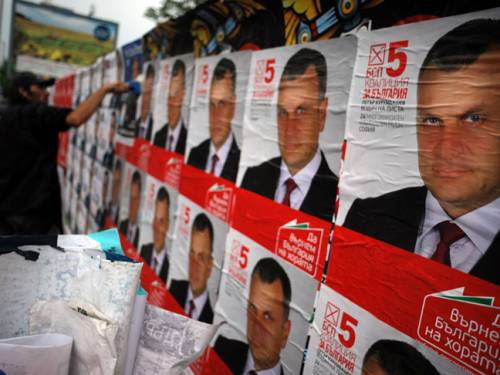
Potential Socialist-led Government in Bulgaria Could Help Russian Energy Interests
Publication: Eurasia Daily Monitor Volume: 10 Issue: 92
By:

The Bulgarian general elections on May 12 produced a hung parliament and little hope that the political stalemate would be easily overcome. Political instability is expected to continue during a prolonged period of appointing a new government. The scandals with pre-election wiretapping and the discovery of additional ballot papers before Election Day continue to resonate with the public, further poisoning the political environment (TV7, BNT, BTA, May 11; Capital Daily, Mediapool.bg, May 15).
The former ruling party, Citizens for the European Development of Bulgaria (GERB), which was ousted by public protests in February, won the election with 30.5 percent of the vote, but failed to gain a parliamentary majority to form a cabinet. In addition, GERB is ostracized by other parties represented in parliament and is unlikely to find coalition partners—it will need two coalition partners to form an administration. The Socialist party (BSP) follows closely behind GERB with 26.6 percent. The other parties in parliament will be the two archenemies—the ethnic Turkish Movement for Rights and Freedoms (MRF) with 11.29 percent of the vote and the ultra-nationalist Ataka with 7.3 percent. Each of them has vowed not to participate in any coalition with the other (BTA, Dnevnik Daily, May 15).
The traditional coalition partners—the Socialists and the Turkish Movement—have together gained 121 out of the 240 seats, which gives them a slight majority over GERB and Ataka, GERB’s controversial supporter in the previous parliament. But Ataka’s leader Volen Siderov has stated that GERB should not continue ruling the country (BTA, May 15). Animosities between GERB and Ataka spiked when the ultra-nationalists took advantage of the public protests against high electricity prices in February that brought down the government of Boyko Borisov. Riding on public sentiment against the electricity distributors (two Czech and one Austrian company), Siderov developed a program aiming to end what he calls “the colonial yoke” in Bulgaria. The program includes re-nationalization of major enterprises, including those in the energy sector, and expelling foreign investors.
In another unprecedented development, for the first time the traditional center-right parties credited with a major contribution to democratization in Bulgaria during the past 24 years, will not be present in the new parliament. The Union of Democratic Forces (UDF) and the Democrats for a Strong Bulgaria (a splinter from the UDF) failed to pass the 4-percent threshold. Their respective leaders Emil Kabaivanov and Ivan Kostov, former prime minister of the most successful reformist government in recent history (1997¬–2001), both resigned the day after the election. The leader of the newly-established Bulgaria for Citizens Movement, Meglena Kuneva, also resigned after her party gained only 3.25 percent of the vote (BNT, Trud, Standart, 24 Chasa, May 13).
The final election results point to the possibility of a Socialist-led minority coalition government, although it will be extremely fragile due to limited parliamentary support. The return of the Socialists, with their pro-Moscow orientation and strong connections with Russian energy interests, poses major questions regarding Bulgaria’s future energy policy. The GERB government did stand up to Russia in defending national energy interests. Borisov cancelled two Russian energy projects: the Burgas-Alexandropolis oil pipeline (for environmental concerns) and the Belene Nuclear Power Plant (for economic unviability and lack of financing.) The Socialists have stated during the election campaign that they would reinstate the Belene NPP project (Focus Information Agency, May 3).
Furthermore, Bulgaria’s support for the Nabucco-West natural gas pipeline may weaken under Moscow’s pressure to build the Russian-led South Stream gas pipeline. The Nabucco-West gas pipeline is a modification of the initial Nabucco pipeline project designed to transfer Caspian gas from Azerbaijan to Europe. Nabucco-West would extend the Trans-Anatolian gas pipeline (TANAP) currently being built from Azerbaijan’s Caspian shore to the western part of Turkey. In May, Sofia issued an environmental permit for the 424-kilometer Bulgarian section of the Nabucco pipeline, ahead of the environmental impact study planned for the South Stream pipeline later this year (Focus Information Agency, May 8).
There is also little doubt that a Socialist government will not allow shale gas exploration and production in Bulgaria. The Socialists openly supported public protests in 2011 and 2012 that led to a moratorium on shale gas exploration in January 2012 (see EDM, January 24, 2012). According to some reports, the Russian energy lobby in Bulgaria financed the anti-shale gas campaign. Gazprom has the most to gain from suspending a potential shale gas boom throughout Central-Eastern Europe.
The urgent need of Russia’s energy lobby to have a friendly government installed in Sofia may help explain why the Socialists ran such an unusually aggressive and negative election campaign replete with scandals. It started with the Socialist party’s attempt, along with Ataka, to hijack public protests against high energy prices in February, making strong statements against the political system as a whole and the parliament as an institution. Latchezar Toshev, a UDF parliamentarian, stated before the Parliamentary Assembly of the Council of Europe (PACE) on April 25 that the groupings that tried to benefit from the protests included the youth branch of the Russophile Association, anti-Western groups, and young members of socialist and neo-communist parties (assembly.coe.int, April 25). These groups gravitate mostly toward the Socialist party and are often mobilized for street protests.
According to Bulgarian political scientist Ognyan Minchev, the aggressive campaign to replace Borisov’s government was likely executed with the help of Russian security services. “None of the Bulgarian security agencies has the capacity and efficiency to pull together such a well-calculated campaign of discrediting GERB and the state institutions—this was clearly the handwriting of the KGB. Russia has already economically subsumed Serbia and Montenegro, it could not possibly leave Bulgaria outside of its perimeter of influence. There are obvious similarities in the events that took place in Georgia six months ago and what is now happening in Bulgaria. In both cases, Moscow attempted to have friendly governments to promote its interests.” Minchev added there are growing concerns in Bulgaria that the United States’ passive policy toward Russia unties the Kremlin’s hands to aggressively pursue economic, energy and political interests in Eastern Europe without repercussions (Author’s interview, May 14).




